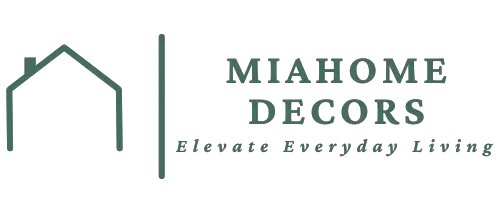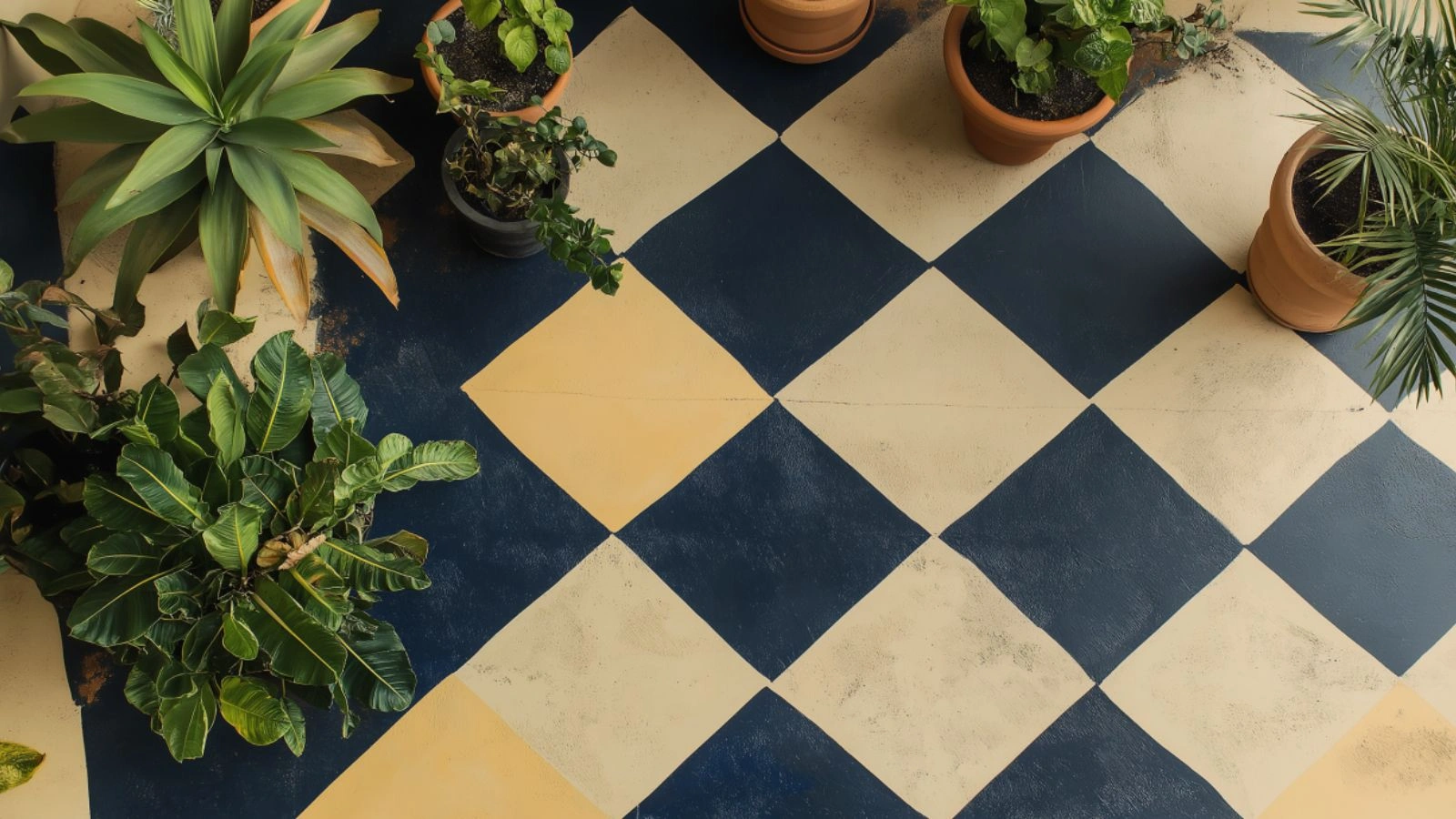Creative Ways to Paint Concrete Patio for a Stylish Makeover
Table of Contents
If your concrete patio is looking dull or outdated, painting it might be the most cost-effective and transformative solution available. According to a survey by the American Society of Landscape Architects, 85% of homeowners are choosing to upgrade outdoor living spaces, and patios top the list of preferred projects. Why? Because the patio sets the tone for your entire backyard ambiance.
Painting a concrete patio is not just about changing color—it’s about adding character, design, and durability. Whether you’re aiming for a coastal vibe, modern monochrome, or a classic checkerboard look, the creative potential is unlimited. Plus, with the right prep and techniques, painted concrete can withstand heavy foot traffic and the elements.
This guide walks you through inventive, stylish ways to paint your concrete patio—from pattern inspiration to step-by-step processes. We’ll explore design ideas like stenciled motifs, faux rugs, geometric patterns, and more, helping you match your outdoor style effortlessly. Expect practical advice, visual tables, and beautiful image prompts to help bring your vision to life.
Prepping Your Concrete Patio for a Flawless Finish
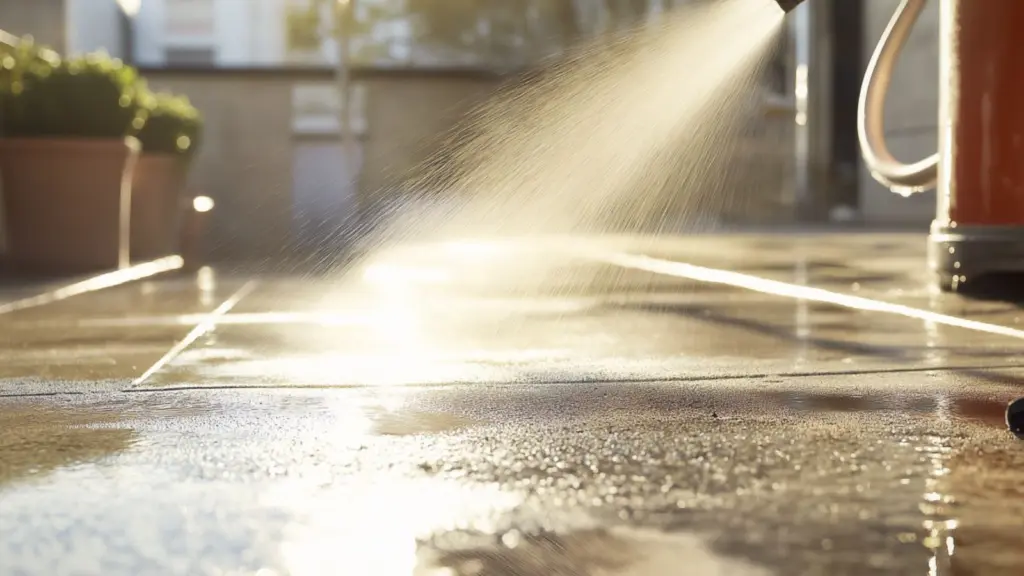
Before you dive into paint palettes and patterns, prepping the surface is crucial. A poorly prepped patio won’t hold paint and can peel quickly—wasting your time and money.
First, start by thoroughly cleaning your patio using a pressure washer or stiff-bristled brush with concrete cleaner. Allow the surface to dry completely. Check for cracks, chips, or uneven patches and repair them with concrete patch filler. A smooth surface ensures paint adheres evenly and lasts longer.
Next, apply a concrete etcher if needed (especially if your patio was previously sealed). Etching opens up the pores of the concrete, helping it absorb the paint better. Finally, prime the surface with a masonry primer to lock in adhesion and block moisture.
Surface Prep Table
| Step | Task | Product Recommendation | Dry Time |
|---|---|---|---|
| 1 | Pressure wash | Concrete cleaner & hose | 24 hours |
| 2 | Fill cracks | Concrete patch compound | 2–4 hours |
| 3 | Etch surface (if needed) | Acid-based concrete etcher | 1–2 hours |
| 4 | Apply primer | Masonry bonding primer | 4–6 hours |
Modern Geometric Patterns for a Bold Statement
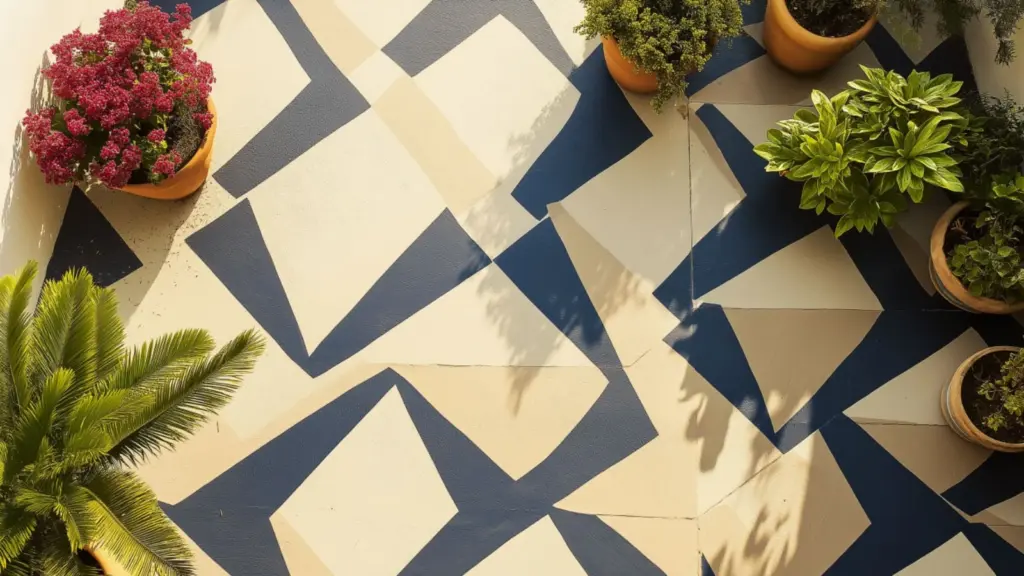
One of the trendiest approaches to painting a concrete patio is using geometric patterns. These designs are modern, eye-catching, and endlessly customizable. Popular styles include diamonds, herringbone, chevrons, and triangles.
To create your geometric pattern:
- Use painter’s tape to map out your design.
- Choose contrasting but complementary paint colors.
- Apply two coats of exterior-grade concrete paint, allowing proper drying time between layers.
- Seal the surface for durability.
Not only does this style add flair, but it’s also great for defining outdoor zones, such as dining or lounging spaces. Use neutrals for a minimalist look or go bold with sunny yellows and deep navy blues.
Geometric Design Ideas Table
| Pattern Type | Best For | Color Ideas | Difficulty |
|---|---|---|---|
| Herringbone | Elegant dining areas | Slate gray + white | Medium |
| Triangle mosaic | Kids’ play or modern patios | Teal + coral + ivory | High |
| Chevron | Walkway borders | Navy + sand beige | Easy |
Stenciled Designs for a Timeless Touch
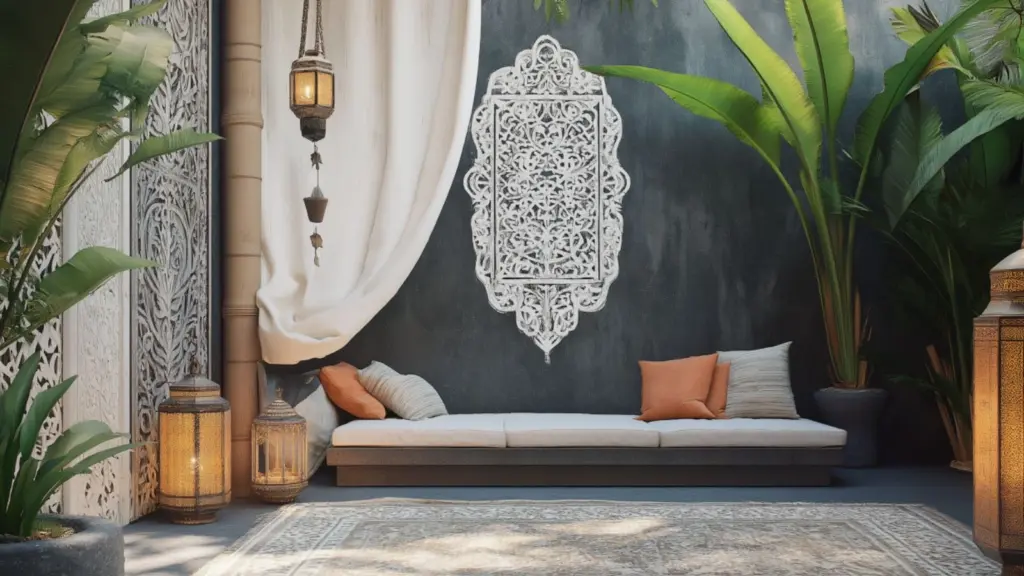
Stenciling is ideal for homeowners who want a decorative look without a full mural. You can purchase durable outdoor stencils or even custom-cut your own with Mylar sheets. This technique works well for Mediterranean, Moroccan, or boho styles.
Apply your stencil using a dense foam roller and minimal paint to avoid bleeding. Focus on symmetry and repetition for the best effect. Whether you’re mimicking patterned tile or a nature-inspired motif, stencils create high impact on a budget.
Stencil Painting Tips Table
| Tip | Why It Matters |
|---|---|
| Use repositionable spray | Keeps the stencil flush with concrete |
| Start in the center | Helps maintain symmetry |
| Seal with polycrylic | Adds weather protection and sheen |
Painted Faux Rugs for Outdoor Charm
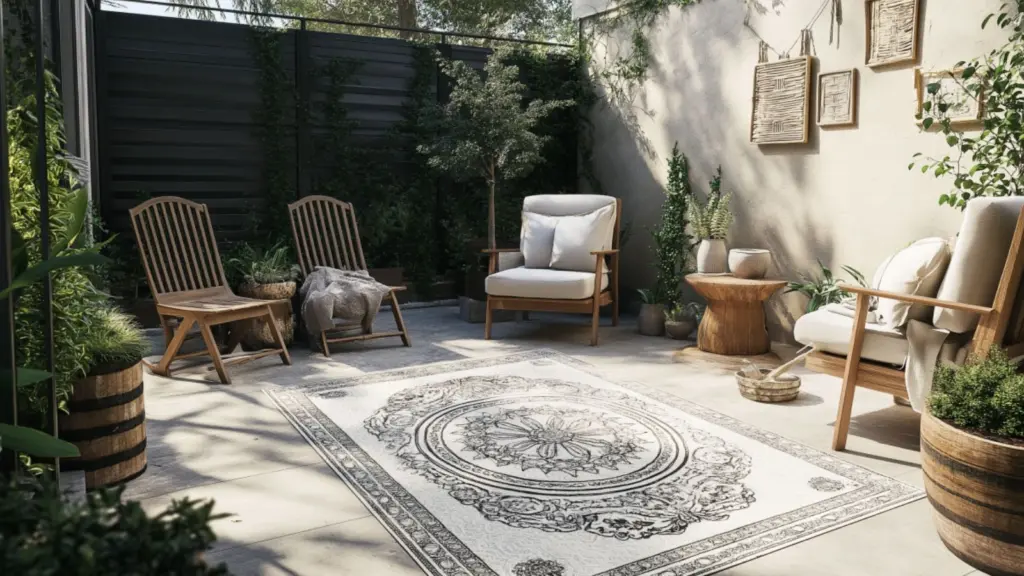
Want to add the softness of a rug without worrying about outdoor wear and tear? Painted faux rugs give you that cozy aesthetic with the durability of painted concrete. This is especially useful in dining or seating zones.
Start by taping out the rug’s perimeter. Add inner shapes like diamonds, stripes, or medallions. Stick to 2–3 paint shades to avoid overwhelming the space. Once painted, apply a clear sealant for weather resistance and easier cleaning.
This approach works especially well with boho, vintage, or rustic styles. A painted rug can also anchor furniture and add the illusion of a finished, pulled-together patio without buying outdoor textiles.
Faux Rug Design Breakdown
| Design Style | Ideal Placement | Color Suggestions | Visual Impact |
|---|---|---|---|
| Bohemian | Under lounge seating | Terracotta, cream, navy | Warm & layered |
| Modern minimal | Under dining table | Black, white, slate | Clean & crisp |
| Vintage medallion | Corner reading nook | Soft blues and browns | Cozy & classic |
Color Blocking for a Contemporary Vibe
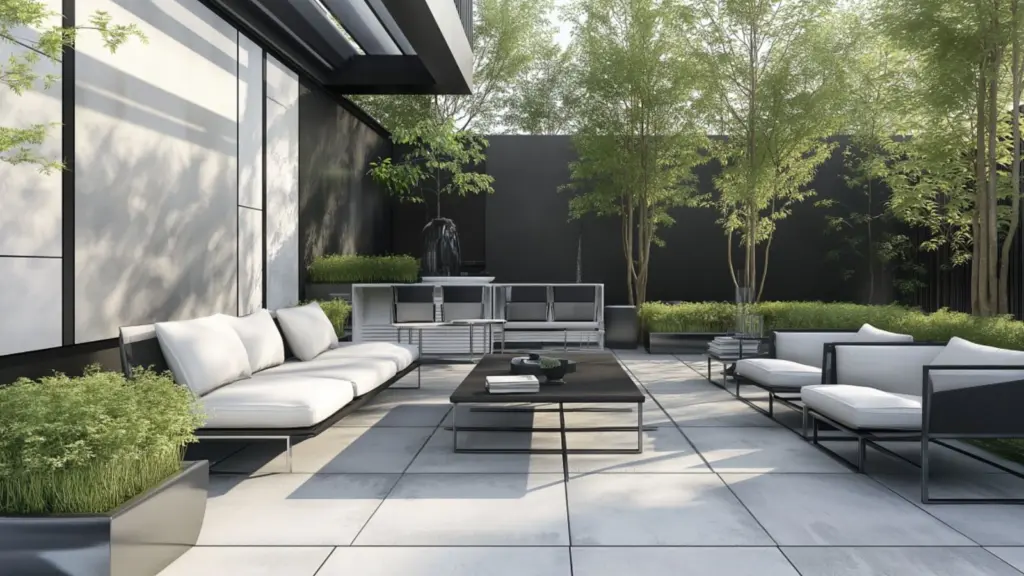
Color blocking involves painting large sections of your patio in different solid colors. This technique is bold, modern, and perfect for minimalist or art-inspired outdoor settings. Choose 2–3 harmonizing shades or go full contrast with opposite colors.
You can use this method to define separate zones—like an outdoor kitchen versus lounge area—or just as a visual interest technique. Be sure to use painter’s tape and level tools to create clean transitions between blocks.
Color Blocking Guide
| Color Palette | Best For | Effect |
|---|---|---|
| Warm tones (terra + tan) | Rustic patios | Earthy and inviting |
| Cool tones (gray + teal) | Urban decks | Calm and structured |
| High contrast (black + white) | Modern homes | Bold and graphic |
Neutral Tones with a Textured Look
Sometimes subtlety is the most powerful choice. Neutral tones like beige, soft gray, taupe, or off-white can dramatically freshen up your patio while keeping it serene and versatile.
Add texture using a sponge, rag-rolling technique, or textured roller to avoid a flat appearance. You can even blend tones for a faux stone effect. This look pairs perfectly with organic wood furniture, potted greenery, and woven decor.
Neutral Texture Painting Techniques
| Method | Tools Needed | Visual Effect |
|---|---|---|
| Sponge technique | Natural sponge, tray | Subtle mottling |
| Rag-rolling | Cotton rag, glaze paint | Marble-like swirls |
| Double rolling | Textured roller, 2 colors | Faux stone depth |
Faux Stone or Tile Effects for Upscale Appeal
With the right technique, paint can mimic high-end materials like slate, terracotta tiles, or even marble. This method gives your patio the illusion of luxury—without the cost or installation time.
You’ll need painter’s tape to outline grout lines. Use a sponge or brush to layer colors, creating depth and natural variation. Finally, seal the surface with a gloss finish to enhance the tile effect.
Faux Material Painting Comparison
| Look Simulated | Base Color | Accent Shades | Finish Needed |
|---|---|---|---|
| Terracotta tile | Rust red | Peach, sand | Satin/gloss |
| Slate stone | Charcoal | Blue-gray, tan | Matte/sealer |
| Marble | White | Gray veining, pearl | Gloss |
Conclusion
A painted concrete patio is more than a weekend project—it’s an opportunity to infuse personality and design into your outdoor living space. Whether you choose modern geometric patterns, cozy faux rugs, or upscale stone looks, the right paint technique can completely redefine your backyard’s vibe.
By prepping the surface carefully and selecting durable paints and sealants, you ensure your work lasts through seasons of sun, rain, and daily life. From subtle elegance to bold expression, these creative ideas prove that with a little imagination (and some painter’s tape), your concrete patio can become the stylish highlight of your home.
